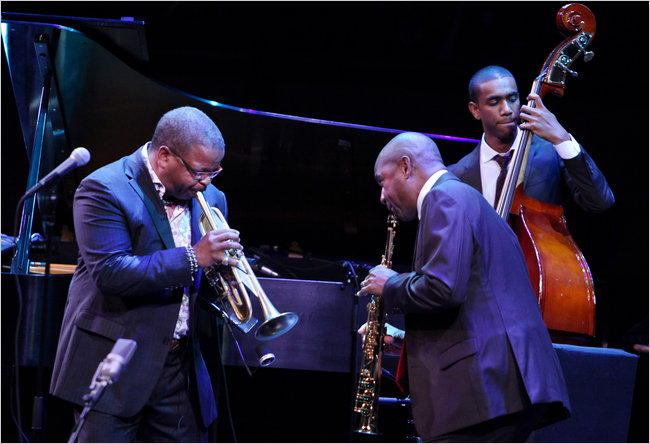 Coltrane’s A Love Supreme: Live in Amsterdam reissue from the Branford Marsalis Quartet out now and available on vinyl for the very first time Read more »
Coltrane’s A Love Supreme: Live in Amsterdam reissue from the Branford Marsalis Quartet out now and available on vinyl for the very first time Read more »
Two Stars, Two Assertive Drummers
Publication: New York Times
Author: Ben Ratliff
Date: October 3, 2010
The trumpeter Terence Blanchard and the saxophonist , in back-to-back sets at Rose Theater on Friday, played what sounded like new music.
 In truth some of it was old. (And some of it was really old.) But the flexible musical rhetoric of the sets felt like the right move for the main theater at , where jazz is often presented with an overarching theme, program notes and a set list published in advance.
In truth some of it was old. (And some of it was really old.) But the flexible musical rhetoric of the sets felt like the right move for the main theater at , where jazz is often presented with an overarching theme, program notes and a set list published in advance.
These were essentially volatile nightclub gigs with greater projection for a bigger space; for both bands the drummers’ fleeting choices exerted great power. For Mr. Marsalis’s band the extra effort meant gnashing and sometimes manic music. For Mr. Blanchard’s it meant cracking open a series of tunes and stitching them together so they seemed like one long episode.
The hungry feeling in Mr. Marsalis’s quartet comes straight from the top: in his sound and phrasing and body language, there’s no mistaking his need to go in hard and almost vengefully. The band’s opening tunes, one written by Mr. Marsalis and one by the pianist Joey Calderazzo, were so fresh that they had no titles. By the second piece — with a strong melody and free rhythm — the drummer, Justin Faulkner, who is 19, was beginning to take over. This was great, for a short while.
Both Mr. Marsalis and Mr. Calderazzo dived into the rhythm section for their solos, pouring gas on the fire. Mr. Marsalis’s bobbed and weaved, but Mr. Calderazzo’s escalated: it got to be full of tremolo patterns and big, barreling chords with the sustain pedal down. Mr. Faulkner stayed on him, matching every cresting run and tiny accent. They were feeding each other’s fast actions, and it was all good reflexes and good theater. But after a few minutes the music felt clobbering and basically unrooted.
So the slow rubato ballad that followed, Mr. Calderazzo’s “Hope” — a song, not a blur — was necessary, like relief for a burn. And then came a deconstruction of ’s “52nd Street Theme,” starting from the back end, with the melody’s answering fillip, and stopping fully in the middle before a Faulkner solo that came in waves of speed and technique. It was a set piece: it made an impression on the audience, and it was pretty close to too much.
The idea of film music has lately become both the positive and negative measure of performances by Mr. Blanchard’s band. Listeners know him for his Spike Lee film soundtracks, and cinematic bits have crept into his studio records and his live performances too. Even onstage he can conjure moods that make you want to close your eyes and let your thoughts drift, sometimes too far. Here, on Friday, you had the moods but not the slackening of the performance.
Mr. Blanchard’s own playing quickly made an impact in the big room. It was bright in tone, dark in mood with a touch of digital echo, and lick-averse; it was gestural and coherent and a little anguished, drawing a cloud of tension through the pieces. Much of his quintet’s set — tunes from the last few years, as well as one piece, “Wandering Wonder,” from his first album, in 1991 — sounded less like a sequence of songs than like one long and highly changeable entity.
The occasional tight passages of melody, the identifying bits of the tunes, felt secondary. They were inscribed in the corners of a much bigger canvas, filled with interactive and collective soloing that always seemed to be leading to the next sequence. The solos came from the pianist Fabian Almazan, the bassist Joshua Crumbly and the saxophonist Brice Winston, but as the set went on, Kendrick Scott, the band’s drummer, became more and more important. It was as if he were the valve for the bandleader’s calm, conductorlike control over the quintet, in which Mr. Blanchard wasn’t only directing the flow but also tightening it to a drip, then opening it up again.
Mr. Blanchard brought out Mr. Marsalis for a few tunes at the end, the theme song to the film “Mo’ Better Blues” and the standard “Autumn Leaves”; their relationship goes back to their early days in New Orleans, and they flew together and battled like old friends, veering into quotations of other songs. But the set’s serious work had already gone down.
Photo by Richard Perry / New York Times
Categories
Tags in Tags
Branford Marsalis Branford Marsalis Quartet ellis marsalis four mfs playin' tunes Joey Calderazzo Justin Faulkner Marsalis Family marsalis music metamorphosen miguel zenon music redeems new orleansFilter by Artist
Marsalis Music Radio
Join Our Mailing List
- RT @bmarsalis: Compliments of the @T_Blanchard archives. https://t.co/4RsXbyEloa — 3 years 17 weeks ago MarsalisMusic